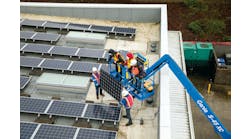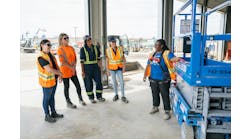Sunbelt Rentals posted total 2009 fiscal year revenue of $1.45 billion for the year ended March 31, a 10.8 percent revenue drop, parent company Ashtead plc announced last week. EBITDA for the year was $500.4 million, compared with $598.9 million in the previous fiscal year, a 16.4 percent drop, while operating profit decreased from $330.9 million in fiscal 2008 to $241.8 million in fiscal 2009, a 26.9 percent decline.
Rental revenue for Sunbelt dropped 8 percent to $1.31 million, with physical utilization of 66 percent, compared with 68 percent for fiscal 2009. Rental revenue increased 2 percent during the first half of the fiscal year, but declined 19 percent in the second half (October to March), during a period when the industry as a whole experienced broad downturns. In the fiscal fourth quarter — the first calendar quarter of 2009 — rental revenue dropped 24 percent year over year, with an 8 percent reduction in fleet size, physical utilization of 61 percent, compared to 64 percent for the year-ago period, and a 14 percent reduction in yield.
For the Ashtead Group as a whole, revenue for the year increased 2 percent to £1.07 billion (about U.S. $1.75 billion), compared with £1.05 billion for the previous year. For the fiscal fourth quarter, however, revenue decreased 5 percent to £232.1 million (U.S. $379.5 million), compared with £244.8 million for the year-ago quarter.
“Market conditions weakened further during the fourth quarter,” said Ashtead chief executive Geoff Drabble. “Revenues in both the U.S. and U.K. markets were adversely affected by lower volumes and yields although we continued to benefit from the stronger dollar. While infrastructure and utility work continues to hold up, the relative lack of finance available for private sector commercial development makes it inevitable that construction volumes overall will remain weak.
“Our business model and capital structure are designed to cope with the cyclical nature of our markets so we were well prepared for this downturn and this is reflected in our robust performance. We took prompt action to control costs and also to address fleet size, which is helping us sustain good utilization. May and early June have seen rental volumes in line with our expectations whilst rental yields have shown some tentative signs of flattening month on month.”
Although Drabble said the company expects continued soft conditions, “we continue to believe that the fundamentals of our markets remain attractive and that, with our continuing focus on meeting the challenges of current market conditions and on cash generation, we are well positioned for the next phase of the cycle.”
Ashtead officials said the speed of the second-half decline was particularly evidenced by the number of private sector projects that stopped work mid-project, with many more postponed or cancelled without ever getting started. Publicly financed infrastructure work is expected to remain stronger through the cycle, “with particular areas of strength being utilities, prisons, schooling and transportation.” However, dependence on local funding brings uncertainty about which projects are likely to go forward.
Ashtead officials predict an increase in consolidation and rental penetration as the economy recovers. “We expect the established trend towards increased outsourcing of equipment supply in the U.S. will accelerate through the cycle,” officials said. “At the same time our industry remains fragmented with a number of smaller rental companies surviving on leasing finance often with low or zero cost interest rates, which historically was provided by the equipment manufacturers. As this source of finance has become increasingly scarce and substantially more expensive, we expect the rental market to consolidate further during the downturn, benefitting the larger, better financed players such as ourselves.”
Based in Fort Mill, S.C., Sunbelt Rentals is No. 3 on the RER 100. Ashtead Group plc, which includes A-Plant, a U.K. rental company, is based in London.





